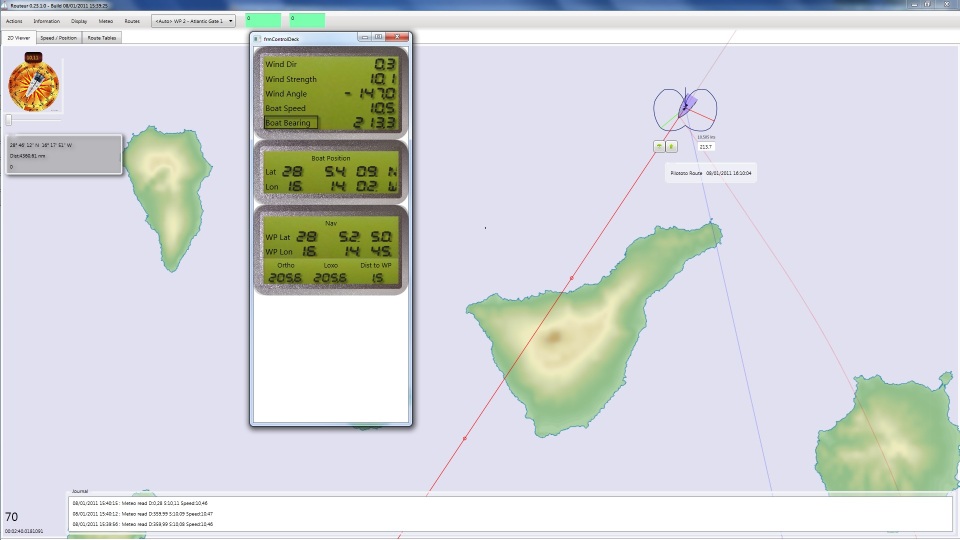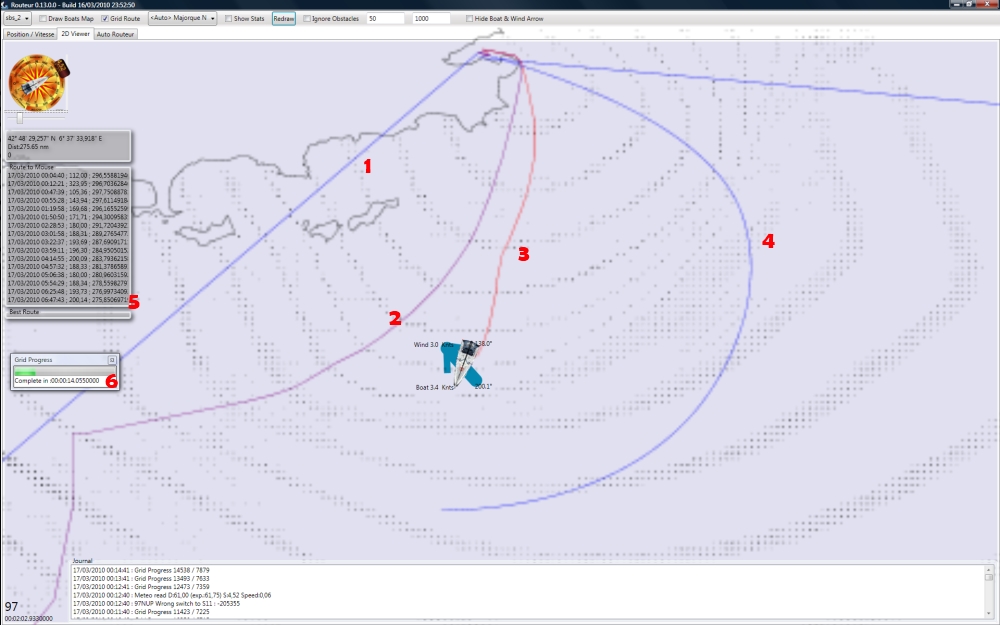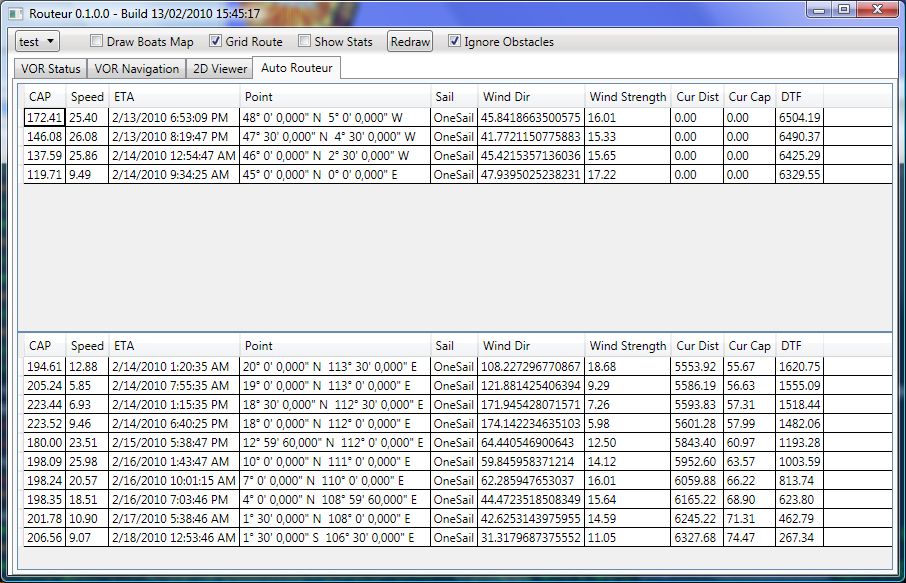Routeur/en : Différence entre versions
| (18 révisions intermédiaires par 4 utilisateurs non affichées) | |||
| Ligne 1 : | Ligne 1 : | ||
| − | {{Languages}} | + | {{Languages|Routeur}} |
== Routing == | == Routing == | ||
| Ligne 6 : | Ligne 6 : | ||
== Installation == | == Installation == | ||
| − | Installation is done simply by running the setup to download | + | Installation is done simply by running the setup to download the Routeur thread on the forum : [http://www.virtual-winds.org/forum/index.php?/topic/6388-sbs-routeur-pour-vlm/] |
The Setup will install the following files and folders: | The Setup will install the following files and folders: | ||
| Ligne 13 : | Ligne 13 : | ||
*Gshhs: File Storage files coastlines of islands and continents | *Gshhs: File Storage files coastlines of islands and continents | ||
*Router file storage application | *Router file storage application | ||
| − | |||
== Configuration == | == Configuration == | ||
=== 1st Launch === | === 1st Launch === | ||
| − | At first launch, the program will copy the file routeur.ini | + | At first launch, the program will copy the file routeur.ini to % APPDATA% \ sbs \ router folder, and open it for your boat login information and the race info. Once these changes are complete (see next § configuration file content description) upon restart the router prompt you for you boat's VLM password and connect to the website to retrieve your boat information. |
| + | |||
=== Configuration File === | === Configuration File === | ||
| − | The application | + | The application configuration GUI. It is therefore necessary to update Routeur.ini configuration file manually. |
The parameters are: | The parameters are: | ||
| Ligne 55 : | Ligne 55 : | ||
south = 0 | south = 0 | ||
</pre> | </pre> | ||
| − | |||
| − | GridGrain | + | You should copy/paste the WP table from the race IC webpage. Then delete the WP0 and put its coordinates in StartLat and StartLon fields. |
| + | |||
| + | The ''GridGrain'' parameter defines the routing grid step size when computing the route. The lower the number, the more accurate the routing, but it will takes more time. I advise you not to fall below .001, unless you have a lot of time and a PC with a lot of RAM. | ||
| + | |||
| + | For weekend and permanent short races use maplevel f and gridgrain 0.005. For big races, like around the world or Route tea maplevel l gridgrain 0.1 and you will avoid errors like "out of memory". | ||
| + | |||
| + | The [RaceZoneOffset] expands the map area calculated from the WP and your boat current position. For each direction, indicate how many degrees must enlarge the area of the map. | ||
| + | |||
| + | == Using the Routeur == | ||
| + | === Introduction === | ||
| + | |||
| + | When launching the application, you must wait until maps are loaded, it takes more or less time depending on the race and level of detail (adding a splash and a progress window would probably be better). | ||
| + | |||
| + | The application window looks like this: | ||
| + | [[Image:Ecran1.jpg]] | ||
| + | |||
| + | It has 3 tabs: | ||
| + | *Position / Speed: Provides position , speed and angle and wind speed information, since the last communication with the server | ||
| + | *2DViewer: The view of the image: | ||
| + | **Compass with boat heading, wind direction and wind strength | ||
| + | **Info Zone mouse position | ||
| + | **Current position of the mouse on the map | ||
| + | **Distance to next WP | ||
| + | **List of recent changes in classification | ||
| + | **Area Best Route | ||
| + | **Quick View of the best calculated route (once a routing cycle is over) | ||
| + | **Area Route to Mouse | ||
| + | **Displaying the best path to mouse position | ||
| + | **Current ranking and time of vacation | ||
| + | **Area Information Engine router | ||
| + | **Tells every vacation the direction and strength of wind | ||
| + | **Indicates routing progress | ||
| + | **Map | ||
| + | ***Move map with click-drag the mouse | ||
| + | ***Zoom in / out with the wheel | ||
| + | **Autorouter | ||
| + | ***Matrix top: current best path in current computation cycle | ||
| + | ***Grid Bottom: best road from previous complete computation cycle | ||
| + | |||
| + | == Controls == | ||
| + | |||
| + | At the top of the window are the following controls: | ||
| + | [[Image:Controles.jpg]] | ||
| + | |||
| + | #Nick Name boat followed, for which it performs routing | ||
| + | #Draw Boat Map: Shows the map position of other boats in the race from the top ranking VLM | ||
| + | #gridroute: Start route calculation | ||
| + | #Combo of WP: List of WP in the file routeur.ini, select WP routing before starting the calculation | ||
| + | #ShowStats: Statistics of current calculation (useful for debug) | ||
| + | #redraw: force the re-design | ||
| + | #ignoreobstacle: calculates the road without taking into account the islands and continents (necessarily much faster;) | ||
| + | #Considers look: Enter a speed in the first zone, and duration in minutes, and then click on redraw to see receive the same route to steady pace since #the current position of the boat | ||
| + | #Hide Boat & Wind arrow: To show or hide the arrow of wind and the vessel's heading to a point routing calculated | ||
| + | |||
| + | == Routing Example == | ||
| + | |||
| + | For example on the tea route, here's an example of what gives the router: | ||
| + | [[Image:Exroutage.jpg]] | ||
| + | |||
| + | ''We do not see the mouse, but at the end of the red path '' | ||
| + | So we see: | ||
| + | #the road that passes by WP | ||
| + | #the best temporary road in the current calculation | ||
| + | #the best route from the starting point of routing to the point where the mouse is. | ||
| + | #the road following the pace required (here 50 degrees for 1000 minutes) | ||
| + | #summary of the road under the mouse and the best way (if it was calculated) | ||
| + | #Progress Indicator calculating routing | ||
| + | |||
| + | The tables indicate the points of the road course in the form: Until such time; take this course, which will lead to such a distance from the goal | ||
| + | == Routing Result table == | ||
| + | |||
| + | Once routing is complete, you can see the calculated route on the autorouter tab: | ||
| + | [[Image:PageRoutage.jpg]] | ||
| + | <BR><BR> | ||
| + | The upper table shows the current best temporary route.<Br> | ||
| + | The lower table shows the best route resulting from the previous calculation cycle<Br> | ||
| + | <BR><BR> | ||
| + | The table below shows the steps with each: | ||
| + | *Charting the Course | ||
| + | *The speed (at the end of the segment) | ||
| + | *The arrival time at the end of this segment | ||
| + | *The point of the segment | ||
| + | *Sail (VLM but we use so that we can forget this column) | ||
| + | *The strength and direction of wind at the end of the segment | ||
| + | *The distance to the end point of the segment (updated each vac) | ||
| + | *The true heading to reach the end point of the segment (updated each vac) | ||
| + | *The distance from the end point of segment arrival | ||
| + | |||
| + | == Output files == | ||
| + | |||
| + | While running, the router creates temporary files, which you can safely delete if you wish. These files are: | ||
| + | *Track_ race number. Dat: boat track log for one race . | ||
| + | *BestRoutex.csv: The best computed route is calculated saved in this file | ||
| + | *TempRoutex.csv: temporary best computed route | ||
| + | |||
| + | Files bestroute and temproute are usefull should the program crashes at the wrong time. The last non-empty file contains information displayed in the program short before the crash. | ||
| + | |||
| + | It is not necessary to delete these files before starting a calculation. | ||
| − | + | These files are stored in the %APPDATA%\sbs\Router. (you can type this in windows explorer and it works) | |
| − | + | [[Catégorie:Routeur (sbs)]] | |
Version actuelle datée du 16 novembre 2016 à 05:53
Sommaire
Routing
Installation
Installation is done simply by running the setup to download the Routeur thread on the forum : [1]
The Setup will install the following files and folders: Router: File Basic application
- GRIB2: Folder for recovery and processing of weather data
- Gshhs: File Storage files coastlines of islands and continents
- Router file storage application
Configuration
1st Launch
At first launch, the program will copy the file routeur.ini to % APPDATA% \ sbs \ router folder, and open it for your boat login information and the race info. Once these changes are complete (see next § configuration file content description) upon restart the router prompt you for you boat's VLM password and connect to the website to retrieve your boat information.
Configuration File
The application configuration GUI. It is therefore necessary to update Routeur.ini configuration file manually.
The parameters are:
[INFO] Nick =''Put here your username vlm'' NumBoat =''Put here the number of boat vlm'' StartLat =''Put here the latitude of the race'' StartLon =''Put here the longitude of departure'' ; Map Level C crude L low ; I intermediate H high F Full Maplevel = l''Put the appropriate level depending on the files you'' ; ; Grid Grain (How far the routing points are from each other) ; ; GridGrain = 0.01''Detail Level''routing [Route] WP1 19,000 -80,750 19,250 -81,750 Rank WP1 WP2 22,000 -82,000 22,333 -83,000 Rank WP2 WP3 22,058 -83,950 22,041 -83,950 Finish Cortes [RaceZoneOffset] south = 0 north = 0 west = 0 south = 0
You should copy/paste the WP table from the race IC webpage. Then delete the WP0 and put its coordinates in StartLat and StartLon fields.
The GridGrain parameter defines the routing grid step size when computing the route. The lower the number, the more accurate the routing, but it will takes more time. I advise you not to fall below .001, unless you have a lot of time and a PC with a lot of RAM.
For weekend and permanent short races use maplevel f and gridgrain 0.005. For big races, like around the world or Route tea maplevel l gridgrain 0.1 and you will avoid errors like "out of memory".
The [RaceZoneOffset] expands the map area calculated from the WP and your boat current position. For each direction, indicate how many degrees must enlarge the area of the map.
Using the Routeur
Introduction
When launching the application, you must wait until maps are loaded, it takes more or less time depending on the race and level of detail (adding a splash and a progress window would probably be better).
The application window looks like this:

It has 3 tabs:
- Position / Speed: Provides position , speed and angle and wind speed information, since the last communication with the server
- 2DViewer: The view of the image:
- Compass with boat heading, wind direction and wind strength
- Info Zone mouse position
- Current position of the mouse on the map
- Distance to next WP
- List of recent changes in classification
- Area Best Route
- Quick View of the best calculated route (once a routing cycle is over)
- Area Route to Mouse
- Displaying the best path to mouse position
- Current ranking and time of vacation
- Area Information Engine router
- Tells every vacation the direction and strength of wind
- Indicates routing progress
- Map
- Move map with click-drag the mouse
- Zoom in / out with the wheel
- Autorouter
- Matrix top: current best path in current computation cycle
- Grid Bottom: best road from previous complete computation cycle
Controls
At the top of the window are the following controls:

- Nick Name boat followed, for which it performs routing
- Draw Boat Map: Shows the map position of other boats in the race from the top ranking VLM
- gridroute: Start route calculation
- Combo of WP: List of WP in the file routeur.ini, select WP routing before starting the calculation
- ShowStats: Statistics of current calculation (useful for debug)
- redraw: force the re-design
- ignoreobstacle: calculates the road without taking into account the islands and continents (necessarily much faster;)
- Considers look: Enter a speed in the first zone, and duration in minutes, and then click on redraw to see receive the same route to steady pace since #the current position of the boat
- Hide Boat & Wind arrow: To show or hide the arrow of wind and the vessel's heading to a point routing calculated
Routing Example
For example on the tea route, here's an example of what gives the router:

We do not see the mouse, but at the end of the red path So we see:
- the road that passes by WP
- the best temporary road in the current calculation
- the best route from the starting point of routing to the point where the mouse is.
- the road following the pace required (here 50 degrees for 1000 minutes)
- summary of the road under the mouse and the best way (if it was calculated)
- Progress Indicator calculating routing
The tables indicate the points of the road course in the form: Until such time; take this course, which will lead to such a distance from the goal
Routing Result table
Once routing is complete, you can see the calculated route on the autorouter tab:

The upper table shows the current best temporary route.
The lower table shows the best route resulting from the previous calculation cycle
The table below shows the steps with each:
- Charting the Course
- The speed (at the end of the segment)
- The arrival time at the end of this segment
- The point of the segment
- Sail (VLM but we use so that we can forget this column)
- The strength and direction of wind at the end of the segment
- The distance to the end point of the segment (updated each vac)
- The true heading to reach the end point of the segment (updated each vac)
- The distance from the end point of segment arrival
Output files
While running, the router creates temporary files, which you can safely delete if you wish. These files are:
- Track_ race number. Dat: boat track log for one race .
- BestRoutex.csv: The best computed route is calculated saved in this file
- TempRoutex.csv: temporary best computed route
Files bestroute and temproute are usefull should the program crashes at the wrong time. The last non-empty file contains information displayed in the program short before the crash.
It is not necessary to delete these files before starting a calculation.
These files are stored in the %APPDATA%\sbs\Router. (you can type this in windows explorer and it works)